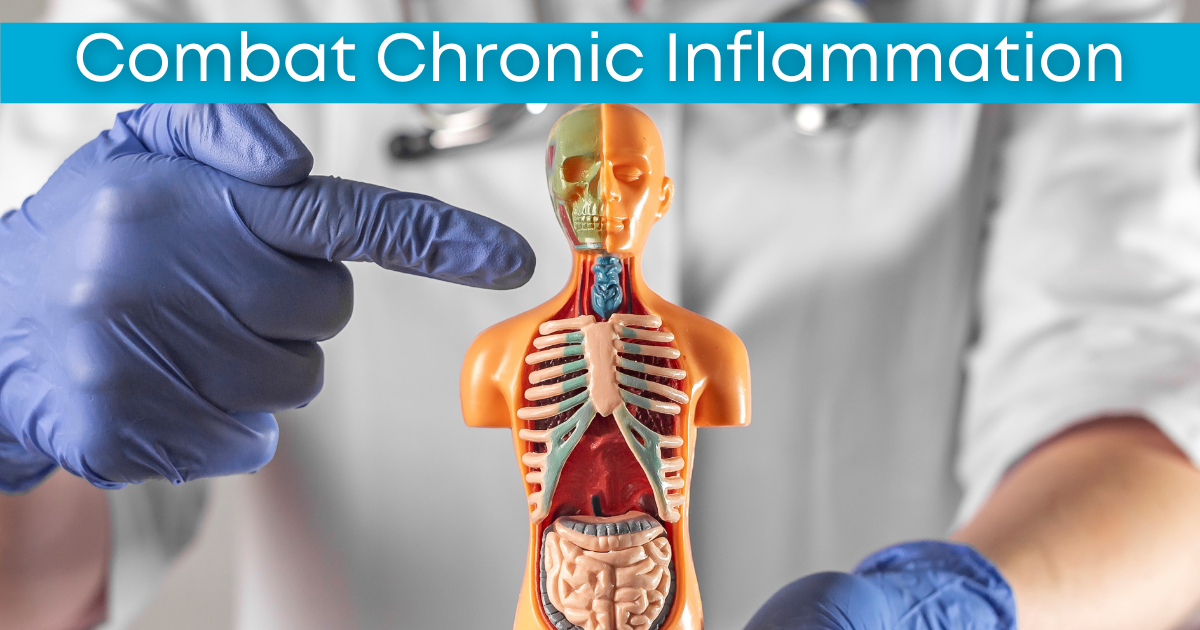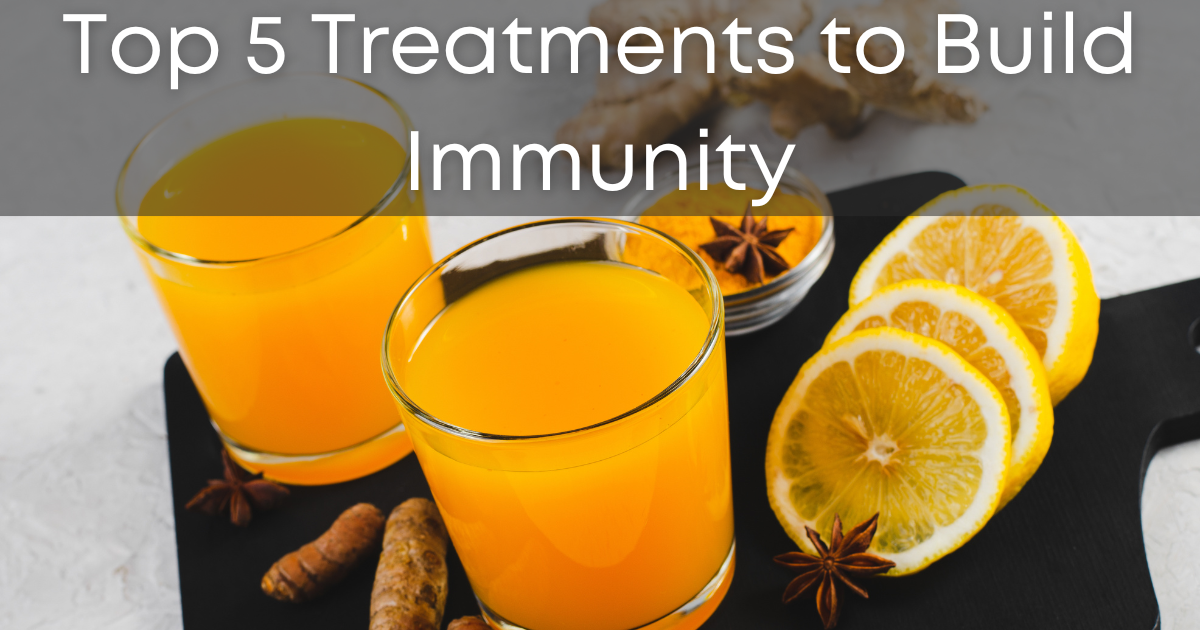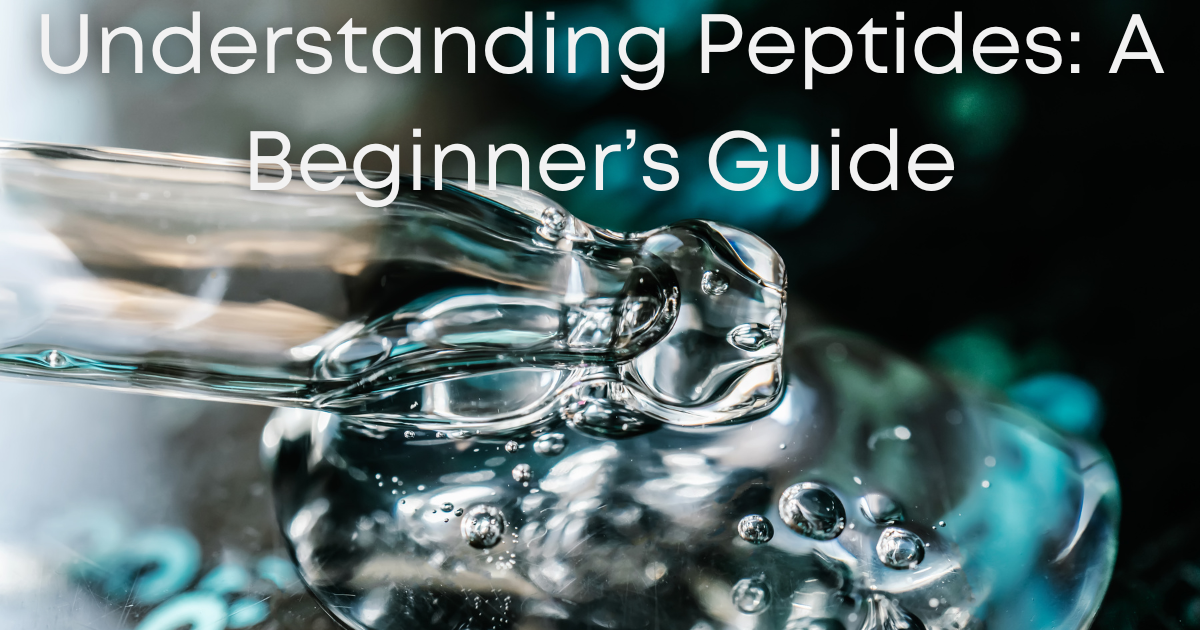Top 5 Treatments to Build Immunity
These cutting-edge treatments are designed to boost your body's natural defenses, helping you remain healthy and resilient against various...
5 min read
Lucas E. : Apr 17, 2024 11:15:00 AM

On the go? Listen to the article instead!
Lets walk through some effective strategies and methods to actively fight inflammation through various therapies and techniques.
Chronic inflammation is a complex and multifaceted condition that occurs when the body's immune response becomes activated for an extended period. Unlike acute inflammation, which is a normal and necessary process to fight off infections and promote healing, chronic inflammation can linger and lead to a host of health issues. It is often triggered by factors such as poor diet, lack of exercise, stress, environmental toxins, and underlying health conditions.
This persistent state of inflammation can wreak havoc on the body, causing damage to tissues and organs over time. It is linked to a wide range of chronic diseases, including heart disease, diabetes, cancer, and autoimmune disorders. Inflammation is like a double-edged sword - while it is a vital part of the body's defense system, when it becomes chronic, it can turn against us and contribute to the development and progression of various health problems.
If chronic inflammation is something you're struggling with, don't worry, as this article provides numerous effective strategies to help alleviate its effects.
Foods can absolutely be a huge source of chronic inflammation for many. But by understanding the impact of your gut health and making informed choices about what you eat. If you're feeling overwhelmed or unsure, health and wellness coach Kaelyn is here to guide you in the right direction. Incorporate anti-inflammatory foods like leafy greens to support your body's natural defenses. A healthy diet is a proven key way to reduce the inflammation in our bodies. With all the research about our gut microbiome, it is understandable that healthy foods impact our immune system and a massive way.
Ozone therapy stimulates the increase of oxygen, crucial for the healing process, and enhances circulation to reduce inflammation by promoting blood flow to affected areas. Research has shown that ozone is effective in lowering serum cytokine levels, which are signaling proteins that regulate inflammation in the body. Balancing cytokines is essential to prevent excessive inflammation and conditions like autoimmune diseases. Incorporating ozone saunas into your weekly routine is a beneficial strategy in the fight against inflammation.
We have plenty of testimonials regarding ozone therapies and would love to give you a consultation on how Ozone Therapy can support your chronic inflammation.
Bromelain - If you have pineapple juice on hand, you're in luck! This enzyme is a powerhouse with anti-inflammatory properties that can boost your immune system. Bromelain is known to help with conditions like tendinitis and minor muscle injuries such as sprains. Research suggests that bromelain may also aid in reducing inflammation post-dental, nasal, and foot surgeries. While more studies are needed, doctors often recommend taking bromelain in capsule or tablet form for optimal benefits, as drinking juice may not provide a sufficient amount.
Capsaicin (Cayenne Pepper) - Capsaicin, the fiery component found in chili peppers, targets proteins that regulate the body's inflammatory response. You can incorporate capsaicin into topical products for direct skin application or sprinkle dried cayenne into your favorite sauces and meat rubs.
Turmeric - Curcumin, a potent compound found in turmeric, not only adds a vibrant yellow color to the spice but also boasts impressive antioxidant and anti-inflammatory properties. This ancient Indian herb has been revered for its potential to alleviate conditions such as arthritis, inflammatory bowel disease, and fatty liver disease. Whether browsing the spice aisle or exploring capsules, creams, drinks, or sprays, curcumin offers a versatile and accessible way to harness its health benefits.
Ginger - Studies have indicated that ginger possesses anti-inflammatory properties akin to ibuprofen. One particular study showcased how ginger extract effectively reduced swelling in rheumatoid arthritis, comparable to the effects of steroids. Additionally, ginger may help alleviate muscle pain post-exercise.
Omega 3 - Although our bodies do not naturally produce these essential fatty acids, fish oil supplements are a rich source of them. Alternatively, you can obtain the recommended amount from specific foods such as fatty fish like salmon and tuna, kale, vegetable and flaxseed oils, nuts, and eggs from chickens fed with flaxseed.
Zinc - Your body relies on this essential micronutrient to help combat inflammation. Zinc can be found in a variety of foods such as chicken, red meat, and fortified cereals, so you may already be getting enough in your diet. However, if you're considering a supplement, it's always best to consult with your healthcare provider first. Zinc has the potential to interact with certain medications, so seeking professional advice is key to ensuring your health and well-being.
Utilizing Photobiomodulation (PBM), also referred to as low-level laser therapy, involves harnessing the power of red and near-infrared light to promote healing, alleviate pain, and combat inflammation effectively. Integrating a red light therapy routine into your weekly detox or wellness regimen can be a powerful tool in combating inflammation effectively.
Numerous research studies support the efficacy of infrared light in reducing inflammation within the body. For individuals experiencing acute inflammation or pain due to an injury, the Curewave Laser presents itself as a highly effective solution to alleviate pain and expedite the healing process.
The impact of sleep deprivation on inflammation is a fascinating topic to explore. One theory suggests that during sleep, blood pressure naturally decreases, allowing blood vessels to relax. However, when sleep is disrupted or restricted, this normal decline in blood pressure is disrupted, potentially triggering inflammation-causing cells in the walls of blood vessels. Striving for a solid 8 hours of restorative sleep is considered the norm for optimal health and well-being.
Establishing a bedtime routine that includes reducing screen time can work wonders for calming your mind before sleep. We all know the temptation to endlessly scroll through social media, but implementing this simple practice can greatly improve your sleep quality. I've found that putting my phone out of reach and picking up a book helps me unwind when I'm not quite ready to doze off. By eliminating bright lights and distractions, your mind can ease into a more restful state, setting the stage for a peaceful night's rest.
If you find it challenging to drift off to sleep, consider incorporating relaxation aids such as melatonin or a soothing cup of chamomile tea with valerian root to help ease your mind and encourage the body to produce the chemicals it needs to prepare you for bed.
An effective relaxation technique that I highly recommend is indulging in a magnesium bath followed by a soothing application of lavender oil on the soles of your feet just before bedtime. This gentle foot massage not only promotes relaxation but also enhances the calming effects of aromatherapy, allowing your senses to unwind and prepare for a restful night's sleep.
A recent study revealed that individuals who practiced regular meditation experienced lower cortisol levels following a social stress test. Moreover, these meditators exhibited a reduced inflammatory response in their bodies, highlighting the powerful impact of mindfulness practices. While reducing stress may seem challenging, we have curated cutting-edge techniques such as the Theta Chamber, V.I.B.E. bed, and Brain Tap to empower you in reclaiming control over your life. These innovative technologies aid in behavioral pattern restructuring, facilitating stress reduction and enhancing overall well-being. These therapies are excellent for people who struggle with meditation on their own.
Alcohol's Effect on Immunity and Inflammation. Alcohol can induce intestinal inflammation through a cascade of mechanisms that subsequently lead to inflammation and organ dysfunction throughout the body, in particular in the liver and brain. One mechanism is by increasing bacterial loads and the permeability of the intestinal wall allowing bacteria to leak through, Alcohol also affects mucosal immunity by suppressing one of the intestine’s main lines of defense against bacteria allowing The bacteria, via endotoxins, to trigger an inflammatory response by the intestine’s immune system, causing a release of proinflammatory cytokines.
With the array of supplements and treatments mentioned above, committing to a personalized plan and discovering what suits you best on your wellness journey can significantly assist in combating inflammation in a world inundated with potential triggers. Even starting with small steps can make a difference, but prioritizing your health by taking proactive measures will undoubtedly reap benefits in the long run! Book a consultation today with our expert team to make a custom treatment plan for your chronic inflammation, and start feeling better in no time!

These cutting-edge treatments are designed to boost your body's natural defenses, helping you remain healthy and resilient against various...

Peptides have become a popular topic of discussion lately, popping up everywhere on the internet and in various products. But what exactly are they...

Ever wondered why celebrities seem to defy aging? No, it's not just good genes or fancy skincare products. The latest buzzword in the health and...